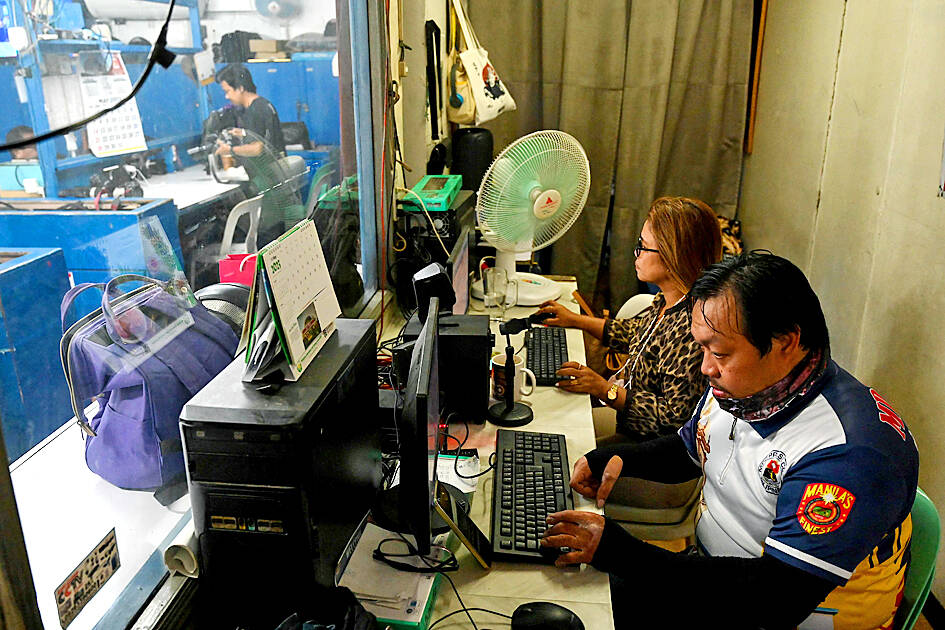Journalism is being battered by propaganda and increasingly sophisticated fakes, aided by artificial intelligence (AI) software and a failure of oversight from tech companies, Reporters Without Borders (RSF) said yesterday.
Overall, the environment for journalists was rated as “bad” in 70 percent of the 180 countries in the non-governmental organization’s annual ranking, and “good” in just eight countries.
Norway and North Korea remain best and worst respectively, for press freedom, according to the 21st annual report, which was published on World Press Freedom Day.

Photo: AFP
This year, RSF focused on the myriad forms of misinformation that are “drowning out” trustworthy news — a problem compounded by the rapid evolution of AI.
“It is the tech industry that allows disinformation to be produced, distributed and amplified,” RSF secretary-general Christophe Deloire said.
“Reliable information is drowned in a deluge of disinformation,” Deloire added. “We are less and less able to perceive the differences between the real and the artificial, the true and the false.”
A prime example was Elon Musk, who took over Twitter late last year, he said.
The report criticizes his new paid-for verification system, saying Musk was pushing “an arbitrary, payment-based approach to information to the extreme.”
The report used the example of Midjourney, an AI program that generates high-quality images that are “feeding social media with increasingly plausible and undetectable fake ‘photos,’” such as those of former US president Donald Trump being manhandled by police and a comatose Julian Assange in a straitjacket that recently went viral.
Traditional forms of political interference are also gaining ground in many countries, RSF said.
About two-thirds of countries have political actors who are “often or systematically involved in massive disinformation or propaganda campaigns,” it said, highlighting the cases of Russia, India and China.
They are assisted by a vast disinformation industry.
RSF recently supported a consortium of investigative journalists working on “Forbidden Stories,” a project which uncovered the activities of Israeli firm “Team Jorge,” which specializes in producing disinformation.
The worst countries in the new ranking, apart from North Korea, were Vietnam, “which has almost completed its hunt of independent reporters and commentators,” and China, “the world’s biggest jailer of journalists.”
India fell from “problematic” to “very bad,” thanks to “media takeovers by oligarchs close to Prime Minister [Narendra] Modi”, and also in Turkey, where the government “has stepped up its persecution of journalists in the run-up to elections scheduled for 14 May.”
The US fell three places to 45th, in part due to a deteriorating security situation for journalists. The biggest drops were Peru (down 33 places to 110), Senegal (down 31 to 104) and Haiti (down 29 to 99th). Brazil, rose from 18 places to 92 thanks to the departure of far-right president Jair Bolsonaro.
The Middle East and North Africa remain the most dangerous region for journalists, while Europe remains the safest, although attacks on journalists in Germany led it to fall five places, RSF said.
The ranking is compiled by combining data on abuses committed against journalists with hundreds of surveys sent to journalists, academics and human rights activists.

BACKLASH: The National Party quit its decades-long partnership with the Liberal Party after their election loss to center-left Labor, which won a historic third term Australia’s National Party has split from its conservative coalition partner of more than 60 years, the Liberal Party, citing policy differences over renewable energy and after a resounding loss at a national election this month. “Its time to have a break,” Nationals leader David Littleproud told reporters yesterday. The split shows the pressure on Australia’s conservative parties after Prime Minister Anthony Albanese’s center-left Labor party won a historic second term in the May 3 election, powered by a voter backlash against US President Donald Trump’s policies. Under the long-standing partnership in state and federal politics, the Liberal and National coalition had shared power

CONTROVERSY: During the performance of Israel’s entrant Yuval Raphael’s song ‘New Day Will Rise,’ loud whistles were heard and two people tried to get on stage Austria’s JJ yesterday won the Eurovision Song Contest, with his operatic song Wasted Love triumphing at the world’s biggest live music television event. After votes from national juries around Europe and viewers from across the continent and beyond, JJ gave Austria its first victory since bearded drag performer Conchita Wurst’s 2014 triumph. After the nail-biting drama as the votes were revealed running into yesterday morning, Austria finished with 436 points, ahead of Israel — whose participation drew protests — on 357 and Estonia on 356. “Thank you to you, Europe, for making my dreams come true,” 24-year-old countertenor JJ, whose

A documentary whose main subject, 25-year-old photojournalist Fatima Hassouna, was killed in an Israeli airstrike in Gaza weeks before it premiered at Cannes stunned viewers into silence at the festival on Thursday. As the cinema lights came back on, filmmaker Sepideh Farsi held up an image of the young Palestinian woman killed with younger siblings on April 16, and encouraged the audience to stand up and clap to pay tribute. “To kill a child, to kill a photographer is unacceptable,” Farsi said. “There are still children to save. It must be done fast,” the exiled Iranian filmmaker added. With Israel

Africa has established the continent’s first space agency to boost Earth observation and data sharing at a time when a more hostile global context is limiting the availability of climate and weather information. The African Space Agency opened its doors last month under the umbrella of the African Union and is headquartered in Cairo. The new organization, which is still being set up and hiring people in key positions, is to coordinate existing national space programs. It aims to improve the continent’s space infrastructure by launching satellites, setting up weather stations and making sure data can be shared across